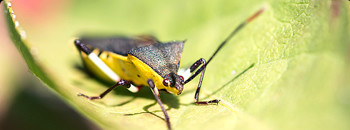 You have investigated your home and have studied and prepared for applying appropriate solutions to the problems you encountered. Now it is time for you to ensure a safe and healthy home by eliminating entry ways for any pest problems you may have.
You have investigated your home and have studied and prepared for applying appropriate solutions to the problems you encountered. Now it is time for you to ensure a safe and healthy home by eliminating entry ways for any pest problems you may have.
Pests like mice, spiders, and ants seek places that fill their basic survival needs of food, water, and shelter. These three conditions are what prompt these creepy crawlers to invade your home and establish it as their own place to live and breed. Often, you can cut off their life support by eliminating one of these three key elements. Doing so requires physical action.
In the elimination step, you actually take action to reduce or prevent pest invasions by enacting a variety of preventative methods you considered appropriate for your home environment during the previous steps in the I.N.S.P.E.C.T. process.
To effectively pest-proof your home, you are going to have to start by fixing problem areas both inside and outside of your home. The key is to tackle any problems before they become too overwhelming. Employing a good preventative strategy beforehand will save you time and money in the long run.
- Eliminate water. Remove standing water outside from bird baths, lined gutters, wheelbarrows, and inside from sinks and showers. Fix any leaky pipes both inside and out that may provide a source of water these annoyances. A lack of water will make it harder for bugs to reproduce.
- Eliminate food. Keeping a clean kitchen can go a long way in making your home less attractive to pests. Sweeping for crumbs that may have fallen and keeping food tightly sealed in containers will make it harder for these bugs to find food.
- Eliminate shelter. This action is probably the best line of defense against pests entering your home environment. In the investigate step, we learned that pests can wiggle their way into your homes through openings as small as one quarter of an inch. A simple solution is to seal up these tiny cracks and crevices with caulk from your local hardware store.
Inside your home, caulking around all doors, windows and window seals where tiny bugs can easily penetrate can prove invaluable, especially in older homes that have settled and might have more points of entry for pests. Check under sinks for the space around where the pipes enter and make sure to seal this area too.
Now take a walk along the exterior of your home—where most pests come from. It is extremely important to seal all windows and doors with gaps that could serve as access points. Chances are, if air and light can pass through, so can pests. So even if you think the crack may be too small, seal it anyway.
Trim trees and bushes near homes so they do not provide direct routes for pests into your home. A good rule of thumb is to leave 18 inches from the plant to the foundation. Consider mowing and weeding often to reduce creating a safe haven for pesky creatures.
Most preventative methods require a little extra time but using these solution suggestions and others found at www.debugthemyths.com will be a lot less expensive than hiring a professional exterminator. Be sure to also check out Janet Hurley’s video for more tricks on eliminating pest entry.

